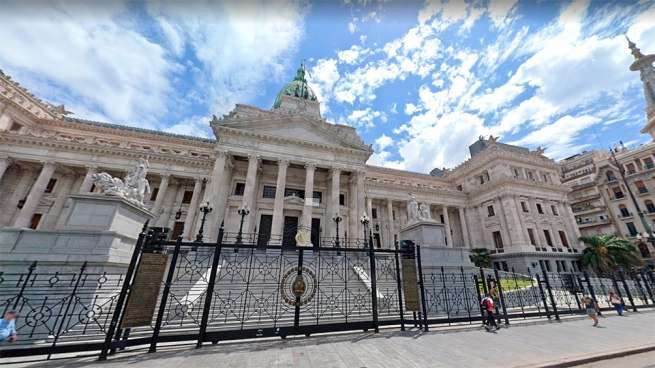The largest business groups in the country, grouped in the group of 6 (G6) and representatives of small and medium enterprises (SMEs) rejected on Tuesday the option that Argentina falls into a default with the International Monetary Fund (IMF) that would lead to higher levels of poverty, inflation and stagnation, and raised in Congress their support for the approval of the Memorandum of Understanding with the multilateral organization.
They did so in the meeting held that afternoon at the meeting of the Budget and Treasury Commission of the Chamber of Deputies, where governors and union representatives also expressed their opinion during the day, as a continuation of the debate on the agreement reached by the national government. with the IMF to restructure the debt for US$ 44,500 million.
In the block dedicated to the business sector, most of the presidents of the entities that make up the G6 were presented: Carlos Weiss of the Argentine Chamber of Construction; Nicholas Pino, of the Argentine Rural Society; Natalio Grinman, of the Argentine Chamber of Commerce; Javier Bolsico of the Association of Argentine Banks; Adelmo Gabbi, of the Buenos Aires Stock Exchangeand Daniel Funes from Rioja, from the Argentine Industrial Union.
These are the entities that bring together the largest companies in the country and that have had, in the last two years, mostly, positions critical of the current administration of the governmentin particular to the economic policy measures, but on this occasion they en bloc supported the agreement to refinance the debt contracted by the management of Mauricio Macri in 2018.
Thus, with its nuances, claims and proposals, the members of the business forum expressed that the rejection by the National Congress of the agreement with the IMF proposed by the national government will lead to a default of payments that will aggravate the social conditions of the country, increasing the high level of poverty, inflation and stagnation.

“We’re absolutely agree and we strongly support” the memorandum, Weiss asserted in his presentation to the Commission, warning that for the entity that leads “the macroeconomic and social consequences that going into default would mean would be dramatic, with enormous social consequences and enormous economic distortions, even deeper to the that are being experienced right now”.
The head of the Rural Society, stated “convinced from the entity and from the field that a default scenario would be much worse”, and understood that an agreement should allow Argentina “take advantage of the postponement of disbursements until 2026 to implement a mechanism that allows greater economic development based on investment and employment”.
For his part, Grinman asserted that “agreeing with the IMF is essentialthe ideal is that it can come out unanimously in this Congress or by a large majority”, understanding that “although the agreement is not the solution to the problems of Argentina, not agreeing is going to be much more burdensome, especially for those who have less”.
Bolsico, in his turn, affirmed that for Adeba “under the current circumstances, Argentina cannot pay the debt with the Fund and puts the country in a binary situation, either it agrees to a refinancing or it goes into default”, for which he stated: “I do not identify a single advantage of not refinancing and it makes this decision that Congress has to take have no dilemma. On the contrary, we will have chance to address and solve problems.
The head of the Stock Exchange also expressed himself “absolutely agree” with the approval of the memorandum, but warned that “it is essential that the Government present an economic plan that not only contemplates the reduction of the fiscal deficit, but also encourages private investment so that it is the engine of generating quality employment”.

To close the participation of the members of the G6, Funes de Rioja maintained the need to “solve the problem of the debt, because it cannot fall into default”, but at the same time “a long-term look is necessary, investment predictability and not change the rules every two years”, completed the head of the UIA by advocating “a social and economic political agreement, in which no one discusses the role of the public sector, but there is a specific role of the private sector that makes growth from the country”.
The day continued with presentations by representatives of small and medium-sized companies such as Alfredo González de la Argentine Confederation of Medium Enterprises; Leo Bilansky of the National Entrepreneurs for Argentine Development; Julian Moreno of the Assembly of Small and Medium Entrepreneurs; Marcelo Fernandez of the General Business Confederationand Daniel Rosato of Industrial Argentine SMEsamong others
After the presentation of the members of the Group of 6, the instance of the SME managers was opened by the head of the CAMEwho pointed out that “the default is not an option” and that “the agreement should be considered an opportunity to clear up doubts about the macro horizon and reorient efforts in the consolidation of the internal market“, but warned: “SMEs do not flee capitalthey all reinvest 100% of their profits in their towns and cities and generating dignity that is work”.
In his turn, Bilansky confronted the G6 directors who preceded him in the meeting by differentiating SMEs from those entities that “They delivered a shameful blank check” for the taking of the debt during the management of Mauricio Macri and which he stated are “institutions that should be investigated in the face of the phenomenal flight of foreign currency emerged at that juncture” for which he proclaimed that “this spurious and illegitimate debt must be investigatedwith the commitment of all the political, business, union and social leadership to clarify this true looting and judge those responsible for a true never again economic “.
? We share the words of our President, @leobilanskiin the plenary of commissions of @DiputadosAR about understanding with #IMF.
? Listen to the full speechhttps://t.co/bTStd5IF6C
— Association of National Businessmen and Businesswomen (@EnacArgentina) March 8, 2022

















